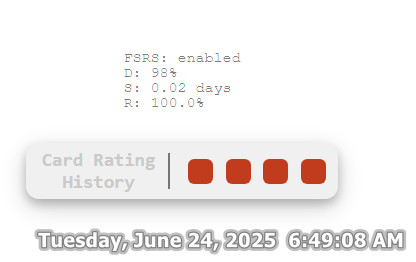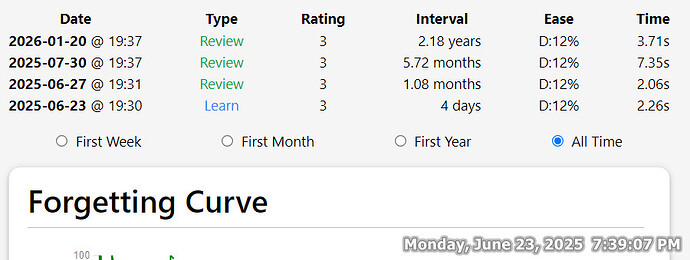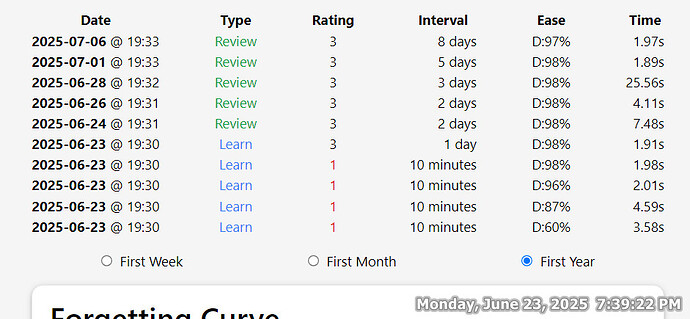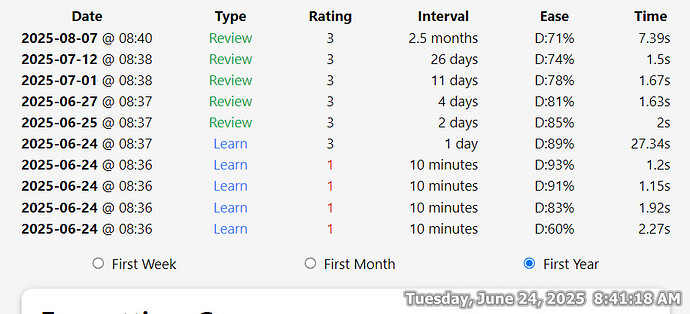In a Nutshell
If rating ‘again’ during learning steps multiple times, for example 4 ‘again’ ratings will make D: 98%, S: 0.02 days.
We need time at first to get new/harder cards well in our mind, but FSRS, instead of helping, gives an “again tax” (high D, low S) to pay in your lifetime as lower intervals for new/harder cards, even if later rated good multiple times.
There’s a lot of forgetting and relearning that happens with new/harder cards [1].
We can make some of these forgetting and relearning loops (again, good loops) happen in learning steps without affecting memory state (D, S, R, etc.) by letting FSRS ignore learning steps.
Learning Languages with FSRS
I’m learning English using a good premade deck like 4000 Essential English Words (all books) [en-en], but with type answer.
For new cards, I will surely see the words for the first time, which is why there are learning steps. However, FSRS still affects learning cards.
For me, I need at least 4 ‘again’ ratings to get 3 things correct (the meaning of the word, pronunciation, typing).
Please don’t suggest making your own deck so you learn the cards before review. Creating a deck like 4000 Essential English Words (all books) [en-en] would take a huge amount of time.
Even so, I will forget what I learned, as when making cards I don’t focus on learning the cards. Instead, I focus on how to make cards that follow The Twenty Rules of Effective Learning (get pic, get audio pronunciation, be short, use cloze, etc…).
I usually learn new topics inside Anki by trial and error (learning steps).
again tax
Quote: "ease hell". This is not a problem that FSRS suffers from. By keeping your learning steps under a day, you will allow FSRS to schedule cards at times it has calculated are optimal for your material and memory. from Anki manual, Learning and Relearning Steps section
It seems for me there is still “ease hell” but a little aggressive.
If you try to learn inside Anki or forget what you learned before Anki (rating ‘again’ during learning steps), you will pay an “again tax” (high D, low S) for your lifetime as lower intervals for your new/harder cards.
e.g.
-
Understand/learn the topic on your own
-
Make the card
-
Review the card (but for any reason, you forget what you learned before Anki)
-
Multiple ‘again’ ratings
-
“again tax” for your lifetime
Explained:
-
After 4 ‘again’ ratings, the difficulty becomes 98%. Based on my test with Anki 25.06b5 OOTB (using FSRS default parameters and a 10m learning step), you will need about 783 ‘good’ ratings after 4 ‘again’ ratings to bring the difficulty back to 12%. If you grade ‘good’ on the first review, you get 12% difficulty immediately.
-
After just 18 ‘good’ ratings after 4 ‘again’ ratings, the intervals will be 2800 days (about 7.5 years). You can get the same 7.5 years with just 5 ‘good’ ratings if you grade ‘good’ on the first review, saving about 13 repetitions (about 60% fewer cards).
(Take this with a grain of salt.)
Comparison Shows “again tax”
Comparison of Grades 1111333333 vs 3333 (if FSRS ignores learning cards reviews) using FSRS default parameters FSRS Visualize
Simulate normal use in Anki: grades 1111333333 vs 3333 (if FSRS ignores learning cards reviews) using FSRS default parameters and 10m learning step in Anki 25.06b5 OOTB
What I’m Doing Now (Not Sure if This Is Correct)
Reset the card manually
With the use of this add-on: See Previous Card Ratings in Reviewer ![]()
When I see something like this, I reset the card manually using Ctrl + Alt + N
Change difficulty (multiplier) parameter (Do it at your own risk, I haven’t tried it)
FSRS default parameters
w=0.2120, 1.2931, 2.3065, 8.2956, 6.4133, 0.8334, 3.0194, 0.0010, 1.8722, 0.1666, 0.7960, 1.4835, 0.0614, 0.2629, 1.6483, 0.6014, 1.8729, 0.5425, 0.0912, 0.0658, 0.1542
Add 0.0250 to difficulty (multiplier) parameter number 8
w=0.2120, 1.2931, 2.3065, 8.2956, 6.4133, 0.8334, 3.0194, 0.0250, 1.8722, 0.1666, 0.7960, 1.4835, 0.0614, 0.2629, 1.6483, 0.6014, 1.8729, 0.5425, 0.0912, 0.0658, 0.1542
Related Features
Why does FSRS take into account all same-day reviews for new cards
[TODO] Option to disable stability_short_term
But closed, not sure why, as said here: Feat/option enable_short_term in training.
Suggestions
-
Implement a toggle in FSRS settings to allow users to choose whether reviews within learning steps affect the card’s memory state.
-
If the current behavior is intended, clarify in the documentation how FSRS interacts with learning steps and the potential impact of multiple ‘again’ ratings.
-
Rename “learning steps” as misleading when FSRS is active, as FSRS affects learning cards. To
initial interval stepswith info: FSRS still updates the memory state but you control the initial interval steps and Recommended: intervals < 1d.
Examples from Reddit (Maybe Caused by This FSRS affects Learning Cards)
FSRS - Daily reviews inevitably increasing
Original poster Actual-Artichoke-436 said:
My theory is that FSRS is making me study recent cards way too much, and I'll eventually fail on some of them at some point since I study them so often. I think I'll actually do better with having those cards spaced up a bit more. To be honest, I noticed that FSRS is making the intervals smaller and smaller for new cards as I keep optimizing, making me study so much of them that I eventually suffer from it.
I feel the same. I actually felt this way right before switching to FSRS. It was easier for me to learn new vocabulary because I became familiar with the kanjis.
I feel like it's not about me struggling with my cards, it's actually easier for me rn, but FSRS makes it hard for new vocab to graduate as they pile up until it actually makes me struggle.
Well I don’t really understand what happened, when I was using the old system I would get to max 200 reviews a day but as soon as I swapped to FSRS I have been at 400+ most days every since.
Please close/low-priority label if you think this is a useless/not-now feature, as maybe I have a wrong idea about how FSRS works.
Thank you.








